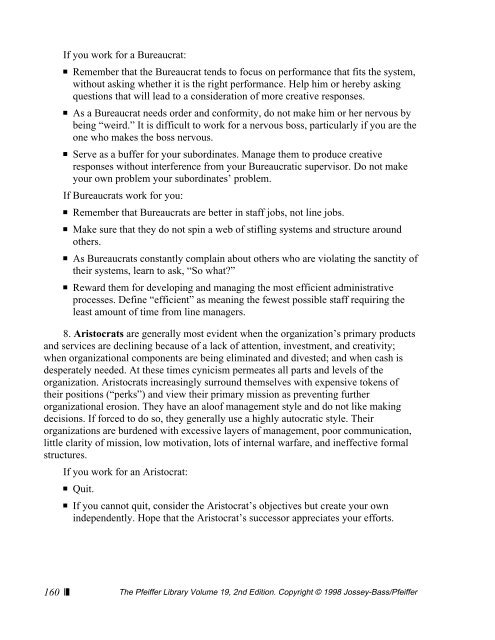motivational analysis of organizations
motivational analysis of organizations
motivational analysis of organizations
You also want an ePaper? Increase the reach of your titles
YUMPU automatically turns print PDFs into web optimized ePapers that Google loves.
160 ❘❚<br />
If you work for a Bureaucrat:<br />
■ Remember that the Bureaucrat tends to focus on performance that fits the system,<br />
without asking whether it is the right performance. Help him or hereby asking<br />
questions that will lead to a consideration <strong>of</strong> more creative responses.<br />
■ As a Bureaucrat needs order and conformity, do not make him or her nervous by<br />
being “weird.” It is difficult to work for a nervous boss, particularly if you are the<br />
one who makes the boss nervous.<br />
■ Serve as a buffer for your subordinates. Manage them to produce creative<br />
responses without interference from your Bureaucratic supervisor. Do not make<br />
your own problem your subordinates’ problem.<br />
If Bureaucrats work for you:<br />
■ Remember that Bureaucrats are better in staff jobs, not line jobs.<br />
■ Make sure that they do not spin a web <strong>of</strong> stifling systems and structure around<br />
others.<br />
■ As Bureaucrats constantly complain about others who are violating the sanctity <strong>of</strong><br />
their systems, learn to ask, “So what?”<br />
■ Reward them for developing and managing the most efficient administrative<br />
processes. Define “efficient” as meaning the fewest possible staff requiring the<br />
least amount <strong>of</strong> time from line managers.<br />
8. Aristocrats are generally most evident when the organization’s primary products<br />
and services are declining because <strong>of</strong> a lack <strong>of</strong> attention, investment, and creativity;<br />
when organizational components are being eliminated and divested; and when cash is<br />
desperately needed. At these times cynicism permeates all parts and levels <strong>of</strong> the<br />
organization. Aristocrats increasingly surround themselves with expensive tokens <strong>of</strong><br />
their positions (“perks”) and view their primary mission as preventing further<br />
organizational erosion. They have an alo<strong>of</strong> management style and do not like making<br />
decisions. If forced to do so, they generally use a highly autocratic style. Their<br />
<strong>organizations</strong> are burdened with excessive layers <strong>of</strong> management, poor communication,<br />
little clarity <strong>of</strong> mission, low motivation, lots <strong>of</strong> internal warfare, and ineffective formal<br />
structures.<br />
If you work for an Aristocrat:<br />
■ Quit.<br />
■ If you cannot quit, consider the Aristocrat’s objectives but create your own<br />
independently. Hope that the Aristocrat’s successor appreciates your efforts.<br />
The Pfeiffer Library Volume 19, 2nd Edition. Copyright © 1998 Jossey-Bass/Pfeiffer

















